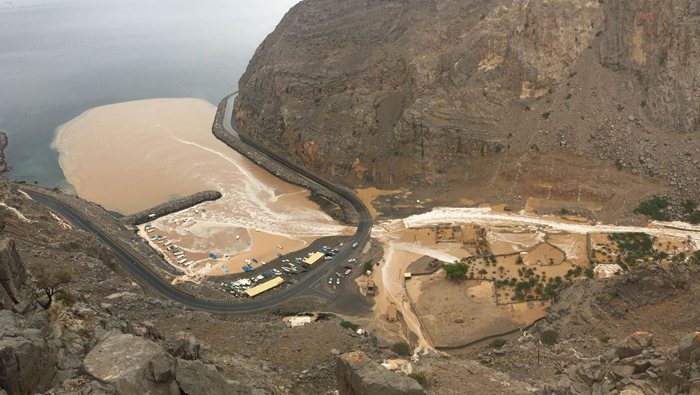
Muscat: As Oman’s cities continue to develop and grow, careful planning will be required to minimise the devastating impact flash floods have on people and property.
Although it is easy to dismiss the possibility of flash floods in arid areas such as the Middle East, it is always important to be prepared for such disasters with climate change resulting in a predicted increase in flash floods in the future.
At the third International Symposium on Flash Floods and Wadi Systems held at the German University of Technology (GUTech), more than 100 experts from across the world met to discuss how this could be mitigated.
“Whenever any advice is issued, it is very important for people to follow that,” said Ahmed Al Barwani, water resources expert at the Ministry of Regional Municipalities and Water Resources.
“People should not drive on the wadis unless they are very safe, because you only have less than half a metre of water in the wadi sometimes, but this is very dangerous, and it can wash away everything, so people should take care.”
The country’s biggest dam is currently under construction in Sur to ward off future flash floods, and Al Barwani says this is one of the measures the Sultanate undertook after Cyclone Gonu to ensure that the nation’s worst natural disaster does not repeat itself in future. “Gonu was a very good lesson for all of us,” he revealed.
“We have flood protection dams in Salalah and Amerat now. The ministry is upgrading the flood risk maps, and these will be distributed to other organisations. We are also monitoring all the floods through 400 stations that analyse data on wadi flows and rainfall, which can be read in real time. We can now alert people even before a flood happens. Once impending cyclones have been announced, people now know what to do.”
A number of topics, including hydraulic simulation, water harvesting and sedimentation, risk assessment management, as well as hazards and mitigation were discussed, and recommendations on these were expected to be forwarded to the ministries.
“We are looking forward to cooperation with other nations, because people are interested in Oman as we have done lots of studies in flood management, we have a good database of previous floods, and we know a lot about the behaviour of floods. We have several PhDs working on this,” stressed Al Barwani.
Long-term planning
A number of Japanese scientists also attended the symposium. Long-term planning saw Japan dilute the impact of Hurricane Fukushima, and Al Barwani was keen to learn from them
“The Japanese have very good experience in all kinds of natural hazards, so we want to learn from them, and whatever we can share will help to improve our networks and the way we mitigate floods,” he emphasised.
Also present was Dr Dalila Loudyi, professor of water and environmental engineering at the Université Hassan II in Morocco.
“In Oman, there are several areas in cities that are not covered with pavement, so flood water runoff will be less harmful,” she explained.
Protection measures
“Flood protection must be observed from the very beginning of city planning, because cities sometimes grow at a fast pace because of the demand from people moving into them.
“It is important not to overlook these things as cities expand,” added Loudyi. “People think that because they are in an arid zone, there is no chance of a flood happening, but the history of events shows that this is not true, because this is a very important and recurring problem.
“There should be good governance for city expansion, through good communication between the administration and those who manage the cities,” she said.
“Green spaces are very important in cities, and you should not cover all the ground with impervious material. Let nature do its job, so it can absorb the water,” she elaborated.